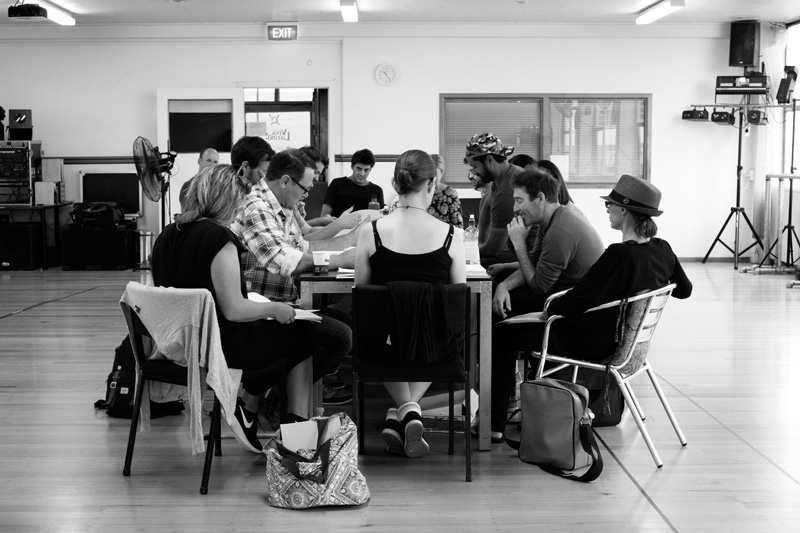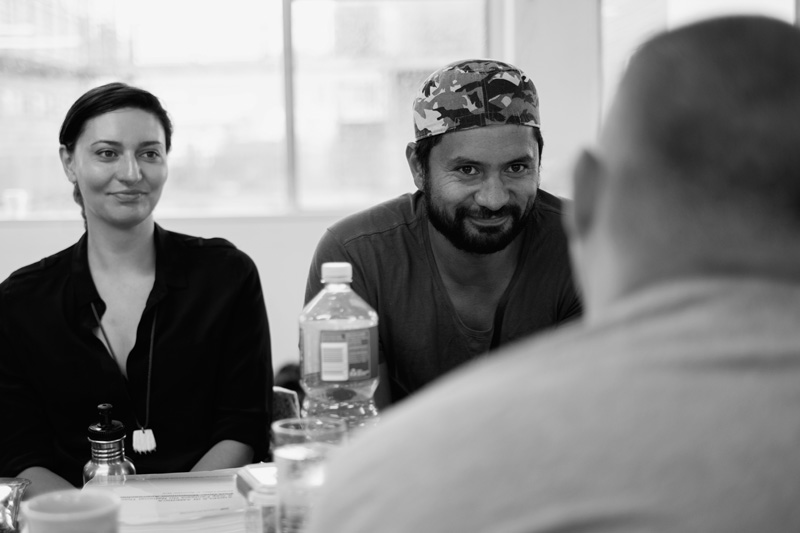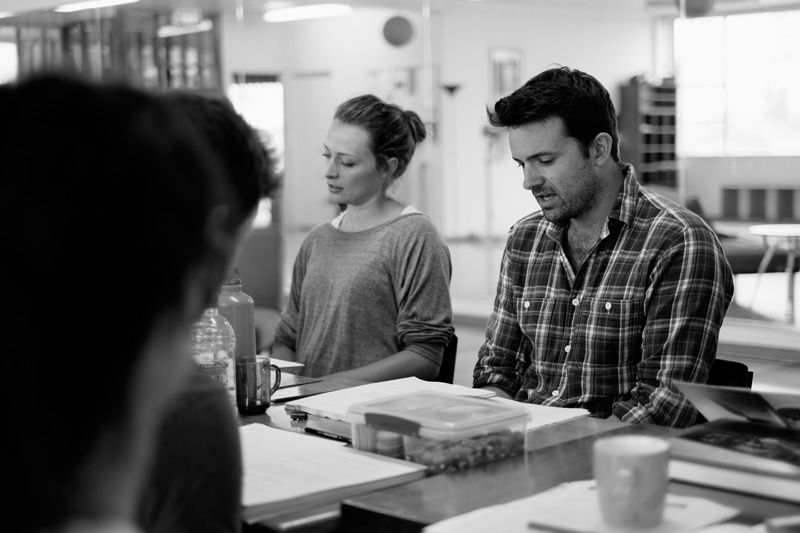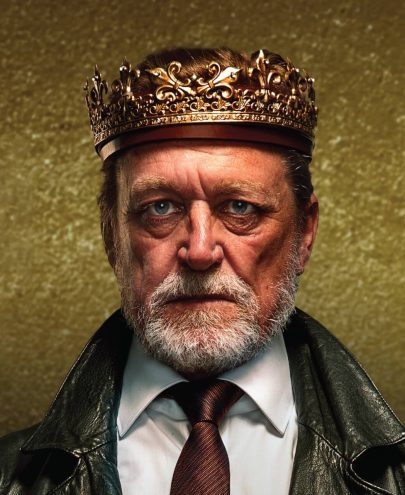Mar 31, 2014 Theatre
Harper: I’m a Mormon.
Prior: I’m a homosexual.
Harper: Oh. In my church we don’t believe in homosexuals.
Prior: In my church we don’t believe in Mormons.
— from Angels in America.
Mia Blake, aka the angel, stands on a bench in the rehearsal studio, her shoulders curled gracefully forwards, elbows out and wrists soft, fingers turned. As if she has wings. She wears a black singlet and a sloppy pair of black drawstring gym pants, and has her hair tied back. “Pull yourself up by your ribcage,” says director Shane Bosher. She stands taller, her shoulders flattening out.
Gareth Reeves, in shorts and a T-shirt, playing a man dying of Aids, sprawls on a low bed before her.
They’re in the early days of rehearsing one of the biggest scenes in the play, and Blake decides it’s a good time to produce her biggest, hammiest Old Testament incantatory voice. “Submit! Submit to the will of heaven!”
There’s a beat. Bosher says, “Okay.” Everyone knows it’s wrong.
Sublime, ridiculous: rarely more than a breath apart — and in this play, the epic late-20th-century masterpiece Angels in America, it is sometimes a very small breath indeed.
Blake says, “I’m sorry, I just had to go there.” But the problem remains. How would you say a line like that?
We’re in a dance studio: mirror wall, low ceiling, the bank of windows over the street reminding us it’s a hot summer Saturday out there. The cast gets Sundays off, though they’re on call in case Bosher changes his mind and wants to do more work.
The play is set in New York in 1985, in the days of the full panicky rush of the Aids epidemic. Liberal Jewish intellectual Louis flees in horror when his lover Prior falls ill; crusading right-wing lawyer Roy tries to deny he has Aids, just as he has always denied he is gay; his Mormon protégé Joe struggles to accept he himself is gay — and then embraces it in an affair with Louis; Joe’s wife Harper can’t accept that, although his imperious mother Hannah proves better at adapting; and Prior’s close friend Belize, who is also Roy’s nurse, does his flamboyant, worldly-weary best to minister to them all. And from time to time, as mentioned, an angel turns up.
It’s easy to see the play as a meditation on being gay, being Jewish, being male. But it’s far more than that. Bosher says it’s about change, about our ability to accept that change is inevitable, and make something good from it.
And more again. Written in anger but not despair, Angels in America is a tribute to our capacity to make ourselves better — spiritually, morally and physically — in the midst of calamity. A hymn — a pagan, Jewish-inspired hymn — to the resilience of kindness and of hope, and also, by no means the least of it, of humour.
Yes, it has a high tone. And it’s desperately intense: essentially, a series of tight scenes in which two or three characters at a time battle each other to a standstill.
It’s also very funny. “My wrath is as fearsome as my countenance is splendid,” declares the preposterous angel, whereupon Prior discovers he has an enormous erection. She shouts at him, “Your penis is of no consequence!”
Angels in America is sublime and ridiculous all at once. Tough to pull off. So to speak.
But the personal is political, as they used to say in the 80s, and as the angel realises, the only thing for it is to help him with an orgasm. Sublime and ridiculous all at once. Tough to pull off.
So to speak. They keep playing it big, having a lot of fun, trying different options, and each is inherently dramatic. But Bosher is shaping, quietly paring them down. Already it’s subtler than the HBO miniseries directed by Mike Nichols in 2003. Bosher has told his cast not to watch it.
He knows the answer to every question they ask. Is there projection? Will the bed be the same height? What sort of wings will the angel have? (Our cover photograph was created by us, and does not show the costume Mia will be wearing.) It’s clear the actors are relaxed, have confidence in what Bosher is doing.
Blake keeps up with the jokes. “After the orgasm, the angel has a fag,” she says, miming.
They go again. Reeves as Prior lies exhausted, flat on his back, head hanging over the edge of the bed towards us. Blake spreads her metaphorical wings and tells him, “The body is the garden of the soul.”
Then she gets to wrecking Prior’s apartment. And that’s Angels in America. Pulitzer Prize winner and multiple winner of Tony and Olivier awards, Golden Globes and Emmys. A journey of soaring imaginative fancy.
Bosher gets up and walks across the room in his socks, the hems of his jeans trapped under his heels, pencil in hand. “What’s gonna happen here,” he says, “is that basically we’ll have a wind machine and flour bombs.”
Mia Blake and Jacob Rawiri in rehearsal.
Angel/ What makes the engine of creation run? Not physics. Ecstatics makes the engine run.
Over dinner in a dumpling joint, Shane Bosher apologises for being “a little bit boring at the moment”, by which he means he’s not drinking. “This afternoon,” he adds, “my brain exploded out the back of my head.” They’d abandoned script work to talk about what it all means. “It’s a bit bigger than I realised.”
And it’s a bit late for him to say that now. The play exists in two distinct parts, each of them over three hours long. Silo will present them separately, with special back-to-back sessions on weekends. Part one, The Millennium Approaches, has been performed here before (once by Watershed in Auckland and once by Circa in Wellington) but not part two, called Perestroika. This production is the biggest thing Silo Theatre has done, certainly in length, probably in theatrical grandeur, and quite possibly in thematic scope too. If it fails, it could kill the company.
It’s so big, Mia Blake says, “I feel tired thinking about it.” But, she adds, “Where else would I get a chance to do something like that? What a treat.”
It’s so big, Mia Blake says, “I feel tired thinking about it.” But, she adds, “Where else would I get a chance to do something like that? What a treat.”
Angels is also Bosher’s last work as artistic director. After 13 years, he’s resigned and will, he hopes, soon be heading off in search of fame and glory overseas. Or work, at least.
He was 18 when he saw the Watershed production. Still a schoolboy, a drama enthusiast, loud and proud, a gay young lad in Hamilton.
“We came up on a class trip to the museum, and I stayed an extra night by myself, in a backpackers. It was the first big play I’d ever seen.” What he remembers was the sexuality, and a big speech about democracy in America.
In Hamilton, he did musical theatre and read his way through “clunky translations” of Ibsen and all the other drama he could find in the public library. Went to Wellington and graduated as an actor from the drama school, Toi Whakaari (“mine was a terrible year”); got a job in publicity and marketing at Downstage; moved on to the fledgling NZ Actors’ Company, run by Tim Balme and Katie Wolfe, and did publicity for them too.
In his fantasy world, Bosher says, he always wanted to play four roles: Oswald in Ibsen’s Ghosts, Edmund in Eugene O’Neill’s Long Day’s Journey into Night, Constantin in Chekhov’s The Seagull, and either Prior or Louis in Angels. “Sometimes one, sometimes the other.” All deeply damaged, which any actor worth their salt will appreciate.
He hasn’t done any of them, and hasn’t acted in eight years. “I gave up after playing Harold in Boys in the Band, that was in 2006. I thought, ‘This is as good as it’s going to get.’” And he realised that when he read scripts, he wasn’t looking for roles for himself. He was reading as a director.
Other people saw that in him earlier than he did. In 2001, Silo was a tiny little theatre off the Grey’s Ave carpark (where the Basement is now). Founded by Sharon Duncan and others out of the ruins of the Watershed, it had seen glory days, but Duncan had left and it was limping along, purposeless except as a venue for actors desperate for work and resigned to not making any money. Propped up by the council through its Arts Alive programme.
Heather Lee, now running a digital production company, managed the Arts Alive fund. She had a new board in place at Silo and they needed a director.
“I would get about 250 props a year to assess for discretionary funding,” she says, “and it was serendipity, I guess. This proposal arrived from a young Toi Whakaari graduate called Shane Bosher. He wanted to come to Auckland and put on his one-man graduation play. I remember reading the play, and his prop, and thinking there was something exceptional about him. I think there were also publicity shots of Shane shamelessly posing in a tight blue lycra leotard. It was all brilliant.”
An actor who knew about the business and promotional side of theatre. “I remember thinking this guy could run the Basement on his own. So I called him up under the guise of talking about his proposal and discovered he truly was visionary, and entertaining, very subversive, and bold and super-smart. So it was a no brainer, he was perfect and up for it.”
Bosher remembers it too. “She gave me the keys and said, ‘Now don’t fuck this up.’”
Oliver Driver, friend and colleague for much of Bosher’s time at Silo, was then at the Auckland Theatre Company. He also remembers. “I told him, ‘Good luck with that, mate.’”
Bosher was 24.
Chelsie Preston-Crayford and Matt Minto.
Harper/ I don’t understand why I’m not dead. When your heart breaks, you should die. But there’s still the rest of you. There’s your breasts and your genitals… They’re amazingly stupid, like babies or faithful dogs. They don’t get it, they just want him. Want him.
Auckland theatre was changing, not least because of the talented actors coming out of Unitec, where Raymond Hawthorne ran the theatre programme. Mia Blake was
among them.
Driver says Bosher’s leadership was inspirational. “Mia came in,” he says. “She started out cleaning toilets, everyone did. Boards don’t make actors clean toilets. It’s about the programme and the people you cast. The leadership you exude.”
This is Blake’s seventh show with Bosher: “I would basically say yes to anything Shane asks me to do. I say yes before I find out about the nudity.”
What? She’s going to be a naked angel? “No.”
Why is she such a fan? “He taught me to be brave. When it’s good to analyse and when to go with your gut.”
Does he lose it? “He gets… huffy. Literally huffy. He throws his hands up, the breathing goes up. ‘Huh, huh.’ He does it when it means so much to him.”
“When they brought him in he didn’t know shit,” says Driver, full of approval. “And they gave him a whole theatre to run.”
“When they brought him in he didn’t know shit,” says Driver, full of approval. “And they gave him a whole theatre to run. That sort of thing, it’s not often done. Shane’s a great example of what happens when you do.”
Everyone thought Bosher would continue to run the place as a venue, attracting ad hoc groups wanting to do edgy shows, working for “profit share”. Bosher saw it differently. He wanted a company, doing company shows, and he wanted his actors to earn a living.
Jennifer Ward-Lealand arrived on the Silo board in 2003 and has been a mainstay for the company, on stage and on the corporate side. She says Bosher has “a terrific eye for a script” and is “great at spotting and developing talent”. In fact, everyone I talked to for this story said those same two things. Ward-Lealand also agrees with Blake that he “creates the space for you to be fearless and brave”.
For the 2005 programme, Bosher scheduled The Goat, a recent play by the celebrated Edward Albee (Who’s Afraid of Virginia Woolf?). Driver directed, with Ward-Lealand and Michael Hurst in the leads: husband and wife playing husband and wife. The story concerns a man who falls, romantically and carnally, in love with a goat.
“Shane always wanted Silo to do visceral theatre,” says Driver. “Theatre that spits in your face. In New York, The Goat played in a 1000-seat theatre. Here it was 100.” Intense, shocking, breathtaking. Sitting in the audience, you shared their sweat.
It was a smash hit, but there was a problem: nobody made much money. That problem was highlighted by another, even bigger hit from the same year: The Women, a Manhattan comedy of manners by Clare Boothe Luce, directed by Katie Wolfe. Despite extending, it wasn’t commercially viable. “I worked out the cast got $1200 each,” says Bosher. “For 13 weeks’ work.”
What “profit share” means, he says, is that “you don’t get anything”. They had to find a bigger theatre.
Harper/ In this world there’s a kind of painful progress. Longing for what we’ve left behind, and dreaming ahead.
In 2008, Silo announced a “special partnership” with The Edge, which is the outfit that runs the council’s entertainment venues in and around Aotea Square. Silo left its Grey’s Ave home and started presenting most of its work in the Herald Theatre, at the back of the Aotea Centre building.
Bigger venue, better incomes. Except, the Herald has its own problems, the main one being that it’s a horrible place. Both the foyer, a vital social hub for any theatre, and the auditorium have a barren feel, as if the last thing that might happen there is anything inspirationally creative. “It’s a difficult venue,” says Driver, having muttered that he better choose his words carefully.
Bosher says his audiences are “urban sophisticates, people with an appetite for risk”, and year after year he has sought out cool, edgy shows to satisfy them.
Bosher says his audiences are “urban sophisticates, people with an appetite for risk”, and year after year he has sought out cool, edgy shows to satisfy them.
Super-stylish farces and comedies of manners, carnivals of strutting sexuality, rollercoasters of psychological disturbance. The best of them are highly entertaining, stimulating and reassuringly smart.
And they feel really odd in the Herald. Good productions languish.
Not everything was in that venue. Also in 2008, Silo took over the Maidment Theatre for Bertolt Brecht’s Threepenny Opera, directed by Hurst. Big cast, big expensive show, big risk. It was a triumph. Two years later, Driver directed Stephen Sondheim’s Assassins in the Concert Chamber. Another big show, another big risk. It bombed.
Since Assassins, Silo has been on a reduced programme: just a few shows a year, and many of them pretty small. Bosher says it’s because they can’t get venues to do more, but it’s obvious the company has been frugally preserving its resources.
So why do Angels, then? “It’s a good fit for Silo. It’s a contemporary classic.”
It’s not a colossal risk? “No. Assassins was a bigger risk. So was Threepenny Opera.”
All cultural organisations struggle with this, just as entrepreneurs in other fields do: you have to take risks or nothing’s worth the effort, and if you never fail you’re not really taking risks. But if your operation is precarious at the best of times, failure really hurts.
Angels in America carries all sorts of risks. In a sense, it is defined by the Mike Nichols HBO series, but these days that production, despite its star-studded cast, looks overly stagey, trapped in the 80s. Presenting Angels today, and not in America, requires perspective of time and place. In other words, Bosher has to reinvent the show.
And for the actors, there is the risk of odious comparisons. Before Mia Blake, the angel was Emma Thompson. Chelsie Preston-Crayford follows Mary-Louise Parker, while Alison Bruce takes on, gulp, Meryl Streep, and Stephen Lovatt sizes up for, double gulp, Al Pacino. No pressure.

Belize/ You know what your problem is, Louis? Your problem is that you are so full of piping hot crap that the mention of your name draws flies.
Oliver Driver and Shane Bosher have been friends for years. They’re not so close right now, which possibly explains why Driver is so effusive in his praise.
“Shane is brilliant,” he tells me, in a whole variety of ways as we chomp through the antipasto at SPQR. He’s furniture, here.
“Shane brings shows not otherwise seen here. He’s a very sneaky director. He gets you to discover it yourself. He asks question after question, he makes you do all the work. You’re stuck with it. With Shane, you can never escape the hard work you have to do as an actor.”
Driver says this as a deep compliment.
Stephen Lovatt, another Bosher regular, says, “He’s the full package. He has the aesthetic sense, and he’s literary, and humble, and he’s a leader! His generosity! He has enormous generosity. More than once, I’ve seen him, he’s kept his shit together in the white-hot heat of a production when the work is not going well. As my mother would say, he kept himself nice.”
When they said these things, I thought, “Yes, but really?”
Lovatt: “He asked me to do [Tom] Stoppard. The Real Inspector Hound. I said, ‘No.’ He said, ‘I want visceral.’ I said, ‘Stoppard?’ He said, ‘Yep.’” The play is a cerebral farce. “Visceral” was a creative risk. A challenge.
And now Bosher is going. I asked him, was he was simply burnt out? “Yes,” he said. “Quite possibly. I can feel myself beginning to stagnate.”
It’s hard on your personal relationships, running a theatre. “You become the guy who can dish out people’s dreams,” says Driver.
It’s hard on your personal relationships, running a theatre. “You become the guy who can dish out people’s dreams,” says Driver. “Everyone finds that hard.” At least in sports, he adds, most people understand the coach should pick the best team each week. In theatre, actors think they deserve their turn. Don’t cast them, and you’re ruining their dreams.
Sit in any room with actors and there will always be at least one of them entertaining the others. That’s not Bosher. He’s got a guffaw of a laugh, and he likes to tell stories, but he’s not obviously needy for an audience.
He’s widely liked, despite those 13 years as a dream-ruiner. But he says he doesn’t have a lot of friends. “Not as many friends as you’d think,” he says. “My job is to manage everyone’s expectations. I do it better with some people than with others.”
He’s looking overseas. “I’m dipping my toes. It’s quite challenging.” Indeed. He’s missed out on a couple of things in Australia. And yet he should go. He needs the refresher, the experience, and we need him to get that and come back. The number of people who have proved they can run a theatre company well in this country is tiny. Probably smaller than the number of companies.
The number with the courage to take risks? Smaller again.
Roy/ Sue somebody. It’s good for the soul.
Another hot afternoon, another pair of actors. Stephen Lovatt is slumped in a chair; Matt Minto stands anxiously before him. It’s their first time working a big scene. Lovatt’s character, the bullying lawyer Roy Cohn, is dying of Aids and Minto’s guy, the young Mormon lawyer Joe who has fallen out with Roy, has come to make peace. Or so it seems. The heart of the scene is Joe’s revelation to Roy that he is gay.
Like Bobbsey twins, Lovatt and Minto are both wearing white V-neck T-shirts and jeans, with bare feet. Bosher is in a branded Silo T-shirt.
Lovatt asks questions and does a lot of talking. He’s explaining all around the character, looking for a way in. He stays in his Brooklyn Jewish accent the entire afternoon, on script and off. Trying to internalise it. Across town, on other days, he’s also rehearsing Noël Coward’s Fallen Angels for the Auckland Theatre Company, playing a toffee-nosed English nitwit. It must be weird switching between the roles.
Minto has much less to say. He’s not sure how to start, and Lovatt isn’t obviously helping him — he won’t even look up. It’s quite the opposite of Mia Blake, with her declamations and her grand gestures, and her easy rapport with Reeves.
In the corner, the dance class secretary, in red top and lips, her black hair pulled back to make the most of her long neck, is discreetly practising a dance move in the wall mirror. Young women in leotards arrive in a flock to pay her money. Downstairs, there’s a pole-dancing class: it’s a hen party, apparently.
It’s Waitangi Day. The room is still filled with the summer light the Angels guys are not out enjoying.
Lovatt internalises, Minto underplays his own lines with a tense stillness, Bosher watches and waits. He’s a sheep dog, holding them near the pen, waiting while they work out where they’re supposed to go. He can point them, but they have to do it.
It’s difficult, because there’s not much time in the rehearsal schedule to go back. At such moments, Bosher has a vocal thing and it’s working overtime today. “Ah, ah, ah,” he goes, almost like a stutter.
Lovatt suddenly leans forwards and gives a cogent explanation of what the scene is about. It’s a deep reading of his own character, and Bosher nods along, punctuating. “Yeah. Yeah. Yeah.”
But Minto says, “I don’t know why Joe is here.” Bosher does some talking then, without giving him an answer. He’s not even trying to set Minto’s mind at rest — he wants to get him engaged, work it out for himself.
They run it again, it’s not much different. Then Bosher changes it. “Look at him,” he says to Lovatt. And the whole scene comes alive. Bosher demands even more. “I want his fury.”
When it’s over, his notes are incidental, mainly to do with business — where the actors move and when. He’s gentled them along a little, but it’s a long-distance thing and they all know it. You can see each of them thinking about that. It stills them. Lovatt says, relief in his voice, that the lines are fantastic to learn.
Right at the end of the afternoon, Minto, who is sitting by himself at the far end of the room, says he’s got it. “He’s not there for Roy. He’s there for himself. It’s like, ‘I’m going to tell you and you’re going to accept it.’ That will work.”
It’s a terrific insight. Bosher gets it straight away and expands on the idea. Suddenly, just like that, it’s been a good day’s work.
Only 37 more, assuming Sundays stay free, and they’ll have a show. It doesn’t seem nearly long enough, and yet it will be.
Angels in America, Parts 1 and 2, Q Theatre. To April 13.
“An outstanding achievement.” Metro theatre reviewer Frances Edmond on Angels in America, part 1 and part 2.







